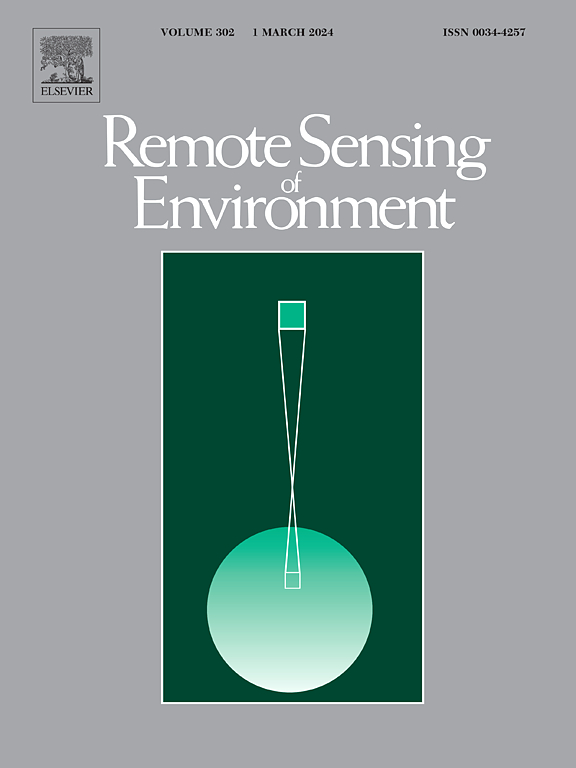Assessment of an Adaptive Subwaveform Coastal Retracker (ASCR) over global coastal oceans for SAR altimetry
IF 11.1
1区 地球科学
Q1 ENVIRONMENTAL SCIENCES
引用次数: 0
Abstract
To improve the data availability of SAR mode altimeters in coastal zones, we propose a new Adaptive Subwaveform Coastal Retracker (ASCR) and include the empirical coastal retracker ITAS (Improved Threshold Adaptive Subwaveform) and the full-waveform coastal retracker MSCR (Modified SAMOSA+ Coastal Retracker) for comparison in this study. The Sentinel-3A/B altimeter data during the period between January 2020 and December 2022 are reprocessed by these coastal retrackers. The performance of the coastal retrackers, as well as the official Ocean retracker, is intensively assessed over global coastal oceans within 100 km to the coastline. The results show that the coastal retrackers outperform the official Ocean retracker in the 0–20 km distance band, with the data availability increased by up to 7 %, which is statistically significant considering the large amount of coastal sea level data. The ASCR retracker achieves overall better performance than both ITAS and MSCR retrackers. The power spectrum analysis further demonstrates that the noise level within 5 km to the coast is about 35 % higher than that offshore. Moreover, about 6 %–20 % of data loss is observed in the same distance band, which may be because the on-board altimeter fails to record the ocean returns reflected from the nadir sea surface. It is also found that the track-coastline angle is an important factor affecting the data quality of SAR-mode altimeters within the last 10 km to the coast. Finally, the crossover analysis and validation against tide gauges prove that the coastal retrackers can achieve better or at least comparable data quality with official Ocean retracker over global coastal oceans.
评估用于合成孔径雷达测高的全球沿岸海洋自适应子波形海岸再跟踪器 (ASCR)
为了提高沿岸区域合成孔径雷达模式高度计的数据可用性,我们提出了一种新的自适应子波形沿岸回轨器(ASCR),并将经验沿岸回轨器 ITAS(改进阈值自适应子波形)和全波形沿岸回轨器 MSCR(修正 SAMOSA+沿岸回轨器)纳入本研究进行比较。对 2020 年 1 月至 2022 年 12 月期间的 "哨兵-3A/B "高度计数据,由这些沿岸重 新跟踪器进行重新处理。在距海岸线 100 公里以内的全球沿岸海域,对沿岸自动跟踪仪和官方海洋自动跟踪仪的性能进行了深入评估。结果表明,在 0-20 公里距离范围内,沿岸自动跟踪仪的性能优于官方海洋自动跟踪仪,数据可用性提高了 7%。ASCR 自动跟踪仪的总体性能优于 ITAS 和 MSCR 自动跟踪仪。功率谱分析进一步表明,距海岸 5 公里范围内的噪声水平比离岸高出约 35%。此外,在同一距离频段内,观测到约 6%-20% 的数据丢失,这可能是由于机载高度计未能记录从天底海面反射的海洋回波。研究还发现,在距海岸最后 10 公里范围内,轨道与海岸线的夹角是影响合成孔径雷达模式高度计数据质量的一个重要因素。最后,对照验潮仪进行的交叉分析和验证证明,在全球沿岸海域,沿岸自动跟踪仪可以获得更好的或至少与官方海洋自动跟踪仪相当的数据质量。
本文章由计算机程序翻译,如有差异,请以英文原文为准。
求助全文
约1分钟内获得全文
求助全文
来源期刊

Remote Sensing of Environment
环境科学-成像科学与照相技术
CiteScore
25.10
自引率
8.90%
发文量
455
审稿时长
53 days
期刊介绍:
Remote Sensing of Environment (RSE) serves the Earth observation community by disseminating results on the theory, science, applications, and technology that contribute to advancing the field of remote sensing. With a thoroughly interdisciplinary approach, RSE encompasses terrestrial, oceanic, and atmospheric sensing.
The journal emphasizes biophysical and quantitative approaches to remote sensing at local to global scales, covering a diverse range of applications and techniques.
RSE serves as a vital platform for the exchange of knowledge and advancements in the dynamic field of remote sensing.
 求助内容:
求助内容: 应助结果提醒方式:
应助结果提醒方式:


